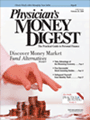PRN: What's New Is Old
When I sat down recently to reviewwhat's new in the world of personalfinance, I was struck by how muchisn't really new. In spite of continualchanges in the news, markets, and technology,a thread of truth remains. Whata great opportunity, said I, for anotherof my infamous "list" columns. To wit:
- Often, people are too close to theirown problems to clearly see a solution.Fish don't know that they are wet, forexample. This is a good reason to findoutside, objective financial advice.
- Your revenue or investment declinesin proportion to the amount ofregulation imposed on it. One hospitalCEO told me, for instance, that onethird of his overhead is regulation related.No action item here—just agrumbling awareness.
- Many financial meetings—personaland medical ones for that matter—have the right tone set by a small gift,studies tell us. Hershey's Kisses, anyone?
- All rules of thumb are by definitionbased on the past, so be careful with thenatural human tendency to project themforward in making financial decisions.Ironic note: The origin of the phrase"rule of thumb" refers to the historicallyallowed maximum diameter of the stickused to beat a wayward wife.
- However counterintuitive, actualpractice shows that investors becomemore risk-tolerant as they age, not less.Old gray heads have learned that theworld isn't coming to an end every timethe Dow swoons. Stay the course.
- When you substitute the word"business" for the word "stock," buyand sell decisions become clearer.
- I was once told that 97% of peopledie at the peak of their wealth, theimplication being that you should livefor today and die less rich, if not poor.Of course, the person who told me thiswas trying to sell me a piece of jewelryfor my wife.
- According to one survey, 70% ofAmericans don't know how muchmoney they will need in retirement,which makes it pretty tough to end upwith enough. It's not surprising to learnthat 44% of current retirees primarilyrely on Social Security.
- You should avoid expensive consumerdebt, like credit card balances.They not only get you with up to 18%interest, but now they have quietlylearned to feast on late fees, up to $30 apop. These are accelerating becausegrace periods have been evaporatingand now approach zero days. To topthings off, our friends at the credit cardcompanies are even using a 1-day latepayment as an excuse to abruptly cancelthose low introductory rate come-ons.Heaven help us to read the fine printand pay off our card debt every monthto avoid the whole problem. Remember:It's a guaranteed 18% return on yourmoney to clear this debt, which is prettyhigh in a 4% bond world.
- Heady gains make some stocksseem low-risk, but make the oppositemore likely later on. What goes up fastis likely to adjust downward eventually.
- Why do we do all of this? Becausepoverty limits choices, destroys self-esteem,and is usually unhealthy.Amen, and the meeting is adjourned.
Jeff Brown, MD, CPE, a practicingphysician who is a partner onthe Stanford University GraduateSchool of Business Alumni ConsultingTeam, teaches in the StanfordSchool of Medicine FamilyPractice Program. He welcomes questions orcomments at jeffebrownmd@aol.com.
Articles in this issue

Choose Wisely when Managing Your Debts
Avoid the Problems with Switching Banks
Be a Thoughtful and Caring Grandparent
Teach Financial Skills to Your Children
Safeguard Yourself from Identity Theft
Happiness, Elusive, but Somewhere Out There
Fund Fundamentals
Diversified Portfolios
Doing Some Flips
Offbeat Market Indicators
Beefed-Up 401(k)s
Mutual Funds: Ten Years
Avoid IRS Audit Triggers
On the Up & Up
Did You Know…
Related Content